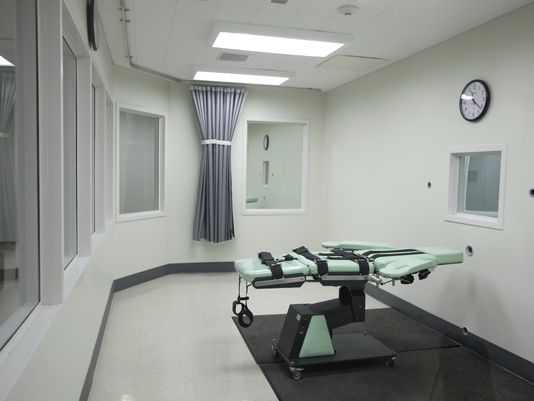NATION: DEATH PENALTY RULED UNCONSTITUTIONAL IN CALIFORNIA
 A federal judge Wednesday struck down California’s death penalty, saying the “dysfunctional” system that makes prisoners wait decades to be executed violates the constitutional ban on cruel and unusual punishment.
A federal judge Wednesday struck down California’s death penalty, saying the “dysfunctional” system that makes prisoners wait decades to be executed violates the constitutional ban on cruel and unusual punishment.
The ruling marks the first time a federal court has found the state’s death penalty to be unconstitutional.
U.S. District Judge Cormac Carney, sitting in Orange County, wrote that since California voters reinstated capital punishment in 1978, more than 900 inmates have been sentenced to death row but only 13 have been executed.
“For the rest, the dysfunctional administration of California’s death penalty system has resulted, and will continue to result, in an inordinate and unpredictable period of delay preceding their actual execution,” Carney wrote in his 29-page ruling on a petition filed by death row inmate Ernest Dewayne Jones. He was convicted of raping and murdering a 50-year-old Southern California accountant in 1992.
“When an individual is condemned to death in California, the sentence carries with it an implicit promise from the state that it will actually be carried out,” he said. “But for too long now, the promise has been an empty one … it has resulted in a system that serves no penological purpose.”
Carey, who was appointed by President George W. Bush, declared that “arbitrary factors, rather than legitimate ones like the nature of the crime or the date of the death sentence, determine whether an individual will actually be executed.”
That, he said, violates the Eighth Amendment of the U.S. Constitution.
The state could appeal to the 9th U.S. Circuit Court of Appeals. Attorney General Kamala Harris, a Democrat, is reviewing the opinion, her press secretary said.
Death penalty opponents hailed the ruling.
“Judge Carney’s ruling today is truly historic,” said Gil Garcetti, former Los Angeles district attorney. “It further proves that the death penalty is broken beyond repair; it is exorbitantly costly, unfair, and serves no legitimate purpose whatsoever. The only solution is to replace the death penalty with life in prison without the possibility of parole.”
No executions have been carried out in California since 2006, when another federal judge determined that the state must revise its procedures for lethal injection. The death house is located inside San Quentin State Prison, north of San Francisco.
In November 2012, California voters narrowly rejected a referendum that would have converted all death sentences to life without parole. Garcetti was a major supporter of that ballot measure, known as Proposition 34.
Buoyed by Californians’ support for capital punishment — and by polls showing their frustration over delays — three former California governors began collecting signatures in February for a state constitutional amendment designed to limit death penalty appeals and to speed executions.
At least 807,615 valid signatures were needed to put the proposition on the November ballot. The filing deadline was July 10, and the secretary of State is determining whether the measure qualified.


